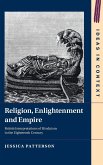"This book traces two transformations in early modern English thinking about the governance of populations. The first, spanning the Tudor and early Stuart eras, was a shift in emphasis in defining the real object of demographic knowledge and intervention. While sixteenth-century engagements with what we would consider demographic entities and processes tended to identify particular, qualitatively defined groups (referred to here as "multitudes" to distinguish them from "population" as a quantity) as their units of analysis, by the middle decades of the seventeenth century something much closer to the national population, as a total and knowable number of people, had come to the fore"--
Hinweis: Dieser Artikel kann nur an eine deutsche Lieferadresse ausgeliefert werden.
Hinweis: Dieser Artikel kann nur an eine deutsche Lieferadresse ausgeliefert werden.








